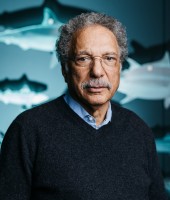Daniel Pauly
Dr. Daniel Pauly was born in Paris, France; he is both French and Canadian and studied fisheries science in Germany, but he spent much of his career in the tropics, notably in the Philippines. Since 1994, he is a Professor of Fisheries at the University of British Columbia, Vancouver (Canada), he directs the Sea Around Us research initiative, funded by a variety of philanthropic foundations, and which is devoted to documenting and mitigating the impact of fisheries on the world’s marine ecosystems. The concepts, methods and software he (co-)developed are documented in over 1000 widely-cited contributions, and have led to his receiving multiple scientific awards, including the Légion d’Honneur. A detailed account of Daniel Pauly’s work and influence may be found in a full-length biography (“Daniel Pauly – un océan de combats” by David Grémillet), published in French in 2019 and in English in 2021 as “The Ocean’s Whistleblower – the remarkable life and work of Daniel Pauly.”
In May 2025, he joins the IAS for a one-month writing residency.
Research interests
Global and small-scale fisheries, marine biologyheries
Small-scale fisheries in the Global South: Why they matter - even for Europe
Studying the small-scale fisheries in Africa, Asia, the Americas, and Oceania and their conflicts with large-scale industrial fisheries is often viewed as an intellectually barren activity.
However, the crucial point is that these small-scale fisheries are not merely a part of the informal economy that governments and scholars neglect; they play a major role in ensuring the food security of their country. Yet, they often go unnoticed in national statistics and even by fisheries economists.
It is only when things go awry that small-scale fisheries and their actors – mostly male fishers and female fish traders - show up in the newsfeeds of wealthy countries. For example, thousands of ex-fishers attempt to reach Europe in rickety boats, and hundreds drown. They have left their homes because there are no more fish to catch in their countries’ waters, largely because the distant-water industrial fleets from developed countries.
This work will connect the activities of distant-water fleets off West Africa with (i) the life-threatening migration issues mentioned above, (ii) the desperate situation of small-scale fisheries in the region, and (iii) the food security issues associated with the processing of staple food in West Africa (sardines and other small, cheap fishes) into fishmeal to feed salmon, e.g., in Norway would be an important contribution at a time when the issues of global equity and sustainability are rightly deemed important.
Key publications
Pauly, D., V. Christensen, J. Dalsgaard, R. Froese and F.C. Torres, Fishing down marine food webs, Science, 279: 860-863, 1998.
Pauly, D, Major trends in small-scale marine fisheries, with emphasis on developing countries and some implications for the social sciences, Maritime Studies (MAST) 4(2): 7-22, 2006.
Pauly, D. and D. Zeller. (Editors), Global Atlas of Marine Fisheries: A critical appraisal of catches and ecosystem impacts, Island Press, Washington D.C., xii +497 p., 2016.
|
Online conference by Daniel Pauly, Professor of Fisheries at the University of British Columbia, Vancouver, as part of the "Paris IAS Ideas" series |
|
|
|
|


